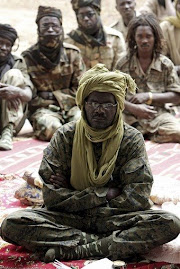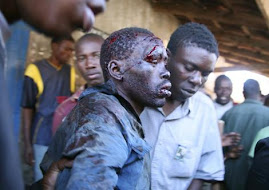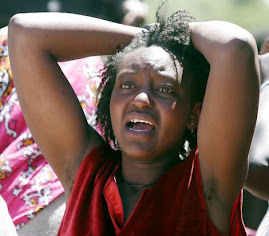Eastern Equatoria State (EES) concluded its SPLM State Congress at the end of April 2008. The congress elected Brig. Louis Lojore Lobong, of the National Security Organ, as its EES SPLM State Chairman. Brig. Lobong effectively replaces Brig. Louis Emor Ojetuk, the current governor of EES, and from now on, runs the affairs of the SPLM statewide.
SPLM constitution calls on its members to hold National, State, Counties or Provinces, Payams or Districts and Bomas or Localities congresses before the general congress. The congresses are supposed to elect their chairmen and other members of the executive to form the SPLM in their respective areas.
It is worth mentioning that SPLM had held their SPLM State Counties' Secretaries' conferences throughout the counties in March 2008. These counties' conferences, like congresses, elect their chairmen and members of their county councils. Each county is supposed to have a council in which its members, the councilors, debate – like in parliament – matters of importance in their counties. The same system applies to the other categories.
In these county council conferences one (1) out of ten counties had retained his position. The Magwi County Secretary is an SPLM who fought in the SPLA, while the rest are co-opted members of the SPLM from within their respective areas of presence. The ten newly elected SPLM County Secretaries, like their overall Chairman, Louis Lobong, officially unseat SPLM former chairmen from their positions in their respective counties.
Congratulations
There will be no need to get to the details of the SPLM democratic exercise in EES. But the least any genuine person could offer to this formal but successful exercise of democracy in EES is congratulations. There are others who are crying foul in some states within the South. This is because they have failed to follow the democratic trend and tenets which the EES SPLM members did follow. The democratic exercise in EES is a double victory: the democratic exercise itself; and the actual peaceful participation; within which patience, tolerance and the will to concede defeat were exercised. These are but common reactions in any democratic processes.
However, a lot in terms of tusks to be accomplished await these new leaders of SPLM in EES. The State has a lot of problems and these are created by sheer misunderstanding between the SPLM and other non-SPLM members in the State, including the NCP. These problems have caused the following:
Disunity between SPLM and non-SPLM members;
Insecurity;
Land occupation & confiscation;
Abuse of authority;
Abuse of law;
Corruption; and
Tribalism
Disunity
There is tension between the SPLM, NCP and non-SPLM members within EES. This is a very serious problem that needs to be looked into by calling for a state conference. This state conference should deal with issues that disunite the citizens of EES. In order to avoid disunity, EES citizenship must be placed above party lines and/or membership. EES lives forever but parties come and go – that is to say that EES people once lived without NCP and SPLM. However, to encourage the tension between SPLM and non-SPLM members in the State would amount to condoning disunity and seriously working to escalate it. The result of this is the current disunity in the State.
Insecurity
The insecurity in the State is resulting from proliferation of small but semi-automatic weapons in the State. The light and semi-automatic weapons are being used by cattle rustlers, individual and group criminals in the State. This has made EES as deadly as a war frontline. Therefore the State needs to disarm most, if not all, of those people who were trained by either the Sudan government or the SPLA during the war because they are now wrecking havoc in terms of cattle rustling and criminal acts committed on the innocent citizens in EES. The security of the State has to be equipped in order to handle issues of cattle rustling and any other armed situation be it individual or group.
Land Occupation & Confiscation
The State has of late entered into very serious issues of land grabbing, especially in Kapoeta, Torit and Magwi Counties. In Kapoeta, Torit and Magwi there are pieces of land or plots – owned plots – grabbed and occupied by Dinka Internally Displaced Persons and Refugees (DIDPRs) who have refused to repatriate home. Some of these people are the displaced during the war in Equatoria and those who were refugees in Kenya, Uganda and Ethiopia.
No one refuses the Dinka tribe land in Equatoria but they have to acquire it through legal means. But the idea that 'we have fought and as such deserve lands everywhere in the South' is meaningless. This is very much so because the Dinka tribe did not fight the war in the South alone; and that does not mean that those other non-Dinka tribesmen who fought the war in the South deserve lands in Dinka land.
The government of EES recently publicly informed owners of plots in Torit that if they don't come to develop their plots they will be confiscated. Meaning that owners of plots who may not in one way or another be able to go to the State immediately will have their plots confiscated. The State government currently categorizes former EDF members, now integrated into the Sudanese army, as unwanted NCP collaborators. The State government is uncomfortable with people who go to the State from Khartoum, especially from non-SPLM members.
The state has to design a workable policy through which repatriation of non-EES citizens back to their original homes is activated. The EES needs to form the Land Commission to deal with issues connected with land statewide in order to send a clear signal to its citizens that all deserve equal justice.
Abuse of Authority
Eastern Equatoria State is notorious with abuse of power. In 2006 the government of EES arrested and locked away its own minister of agriculture. A year later, it arrested, chained and locked up its own minister of finance. It arrested and locked up a humanitarian worker. It abducted and tortured a Joint Integrated Unit (JIUs) Major. It arrested and locked up an SAF Lt-Col. (Former EDF) who was to coordinate the Demobilization, Disarmament and Reintegration of former EDF in the State. It arrested innocent citizens who might have, by mistake, crossed a red line deliberately made to encircle the governor's house. The successor of the chained finance minister in EES was also believed to have locked up a director in his ministry.
It should be noted by the new leadership that no one has the right to arrest and sentence another human being without the proper utilization of law through the existing legal structures that have to be strengthened. The interim State Constitution, like the South Sudan Interim Constitution, clearly says everybody is innocent until proven guilty by a court of law.
It is also known that the current government oftenly interferes with the affairs of the legislature in EES. There were attempts to impeach the EES governor in EES, a matter that angered the governor who interfered in the work of the legislature and helped to remove the former Speaker and replaced him with a lady who is currently the Speaker in EES.
The new leadership has to know that the legislature is one of the arms of government in EES. It is completely independent and needs no interference from either the executive or the judiciary. Thus, the new leadership has to work hard to end all forms of abuse of authority in EES.
Abuse of law
This is the same as the above because it also involves the abuse of authority. Abuse of authority includes the misbehaviour of SPLM soldiers within the towns of Torit and Kapoeta. Members of the SPLA JIUs clashed with police in Torit and killed a number of innocent civilians in Kapoeta.
If law is abused, sometimes by those who fought to ensure that such laws are put in place, what would be the impact of such on ordinary citizens? Organised forces that do not abide by laws bestowed upon the constitution by its own citizens ought to be taken for reorientation to learn more about their role in society. The state has to work hand in hand with the commanders of these organised forces and map out a serious cooperation to ensure that no SPLM soldier abuses the law.
Corruption
The ministry of finance in EES was reported to have entered into some secret deals with a company in Uganda which supplied the State government with second hand cars instead of new ones. Apart from this there is nothing officially or unofficially that has been reported in terms of corruption. The issue of the vehicles was corruption. If it is true, then it must be discouraged by the new leadership, which must form anti-corruption commission to monitor corruption in the state.
Tribalism
The state needs to form anti-tribalism commission, at all levels in the state, to help the state government fight tribalism in all its forms. Trying to ignore this element of tribalism in the state would be like sanctioning a cancerous element that would slowly but surely destroy the state and its social fabric. Further, the people of EES cannot be in a position to accuse others of tribalism when tribalism exists and condoned in EES.
Conclusion
The current EES government which is still run by the former SPLM State Chairman, Aloysius Emor Ojetuk, should be able to understand that the success of Brig. Louis Lobong is based on a very serious political mobilization work. If His Excellency the governor had ignored this fact, Brig. Lobong and those who worked for him should not be blamed because they have understood that politics of isolation, exclusion and arrogance does not work and will never work. Thus, it will only be mature to accept the result and wait for another opportunity that the constitution may unveil in future. Any attempts aimed at revenging on the result of the general congress in any way would be counterproductive as they may encourage intra-party conflict within EES.
However, the reaction of the governor to the election results was commendable indeed. It was reported that the governor conceded defeat and congratulated Brig. Lobong for winning and referred to him as 'my chairman.' This is the political maturity of a high caliber. This political maturity should be developed by other members of EES citizenship so that EES could wheel forward along the path of true and sincere democracy.
In the same understanding, the chairman-elect in EES should also know that H.E. Lt-Gen. Salva Kiir Mayardit, the Chairman of SPLM, may and may not appoint him immediately as governor for EES. This could be attributable to many reasons and two of them are visible: maintenance of unity of SPLM rank and file within EES; and the fact that general elections are around the corner.
The unity of the SPLM rank and file in EES would be one of the first things that the chairman of SPLM could look into. The election of the SPLM State chairman by itself was an exercise within which a few hearts got broken. Those defeated members of SPLM in EES need to settle from the defeat they had received during the exercise. Thus, replacing the governor almost immediately could further exacerbate disunity and that is what the national SPLM chairman may be looking into.
The SPLM national chairman would also look into the fact that general elections are around the corner and there is no fear whatsoever to rush the appointment of SPLM EES and other States' Chairmen-elect as governors. Given their popularity in their respective States, there is no doubt that these SPLM State chairmen would win the elections come 2009. Thus, the EES chairman-elect needs to be patient, and more so, he should never think that his appointment is being delayed for a reason or two.
















No comments:
Post a Comment